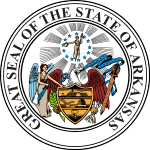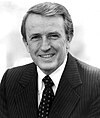
The Governor-General of the Commonwealth of Australia is the representative of the Australian monarch, currently Queen Elizabeth II. As the Queen is shared equally with the 15 other Commonwealth realms, and resides in the United Kingdom, she, on the advice of her prime minister, appoints a governor-general to carry out constitutional duties within the Commonwealth of Australia. The governor-general has formal presidency over the Federal Executive Council and is commander-in-chief of the Australian Defence Force. The functions of the governor-general include appointing ministers, judges, and ambassadors; giving royal assent to legislation passed by parliament; issuing writs for election; and bestowing Australian honours.

The Governor of New York is the chief executive of the U.S. state of New York. The governor is the head of the executive branch of New York's state government and the commander-in-chief of the state's military and naval forces.

The Governor General of Canada is the federal viceregal representative of the Canadian monarch, currently Queen Elizabeth II. The person of the sovereign is shared equally both with the 15 other Commonwealth realms and the 10 provinces of Canada, but resides predominantly in her oldest and most populous realm, the United Kingdom. The Queen, on the advice of her Canadian prime minister, appoints a governor general to carry out most of her constitutional and ceremonial duties. The commission is for an unfixed period of time—known as serving at Her Majesty's pleasure—though five years is the normal convention. Beginning in 1959, it has also been traditional to rotate between anglophone and francophone incumbents—although many recent governors general have been bilingual. Once in office, the governor general maintains direct contact with the Queen, wherever she may be at the time.
Governor-general or governor general, in modern usage, is the title of an office-holder appointed to represent the monarch of a sovereign state in the governing of an independent realm. Governors-general have also previously been appointed in respect of major colonial states or other territories held by either a monarchy or republic, such as French Indochina.
A governor is, in most cases, a public official with the power to govern the executive branch of a non-sovereign or sub-national level of government, ranking under the head of state. In federations, governor may be the title of a politician who governs a constituent state and may be either appointed or elected. The power of the individual governor can vary dramatically between political systems, with some governors having only nominal or largely ceremonial power, while others having a complete control over the entire government.

The Governor of California is the head of government of the U.S. state of California. The California Governor is the chief executive of the state government and the commander-in-chief of the California National Guard and the California State Military Reserve.

The Governor of Texas is the head of the executive branch of Texas's government and the commander-in-chief of the state's military forces. The governor has the power to either approve or veto bills passed by the Texas Legislature, and to convene the legislature. The governor may grant pardons in cases other than impeachment or in the case of treason, with permission by the legislature. The current Governor is Greg Abbott.

The Governor of the State of New Jersey is head of the executive branch of New Jersey's state government. The office of governor is an elected position, for which elected officials serve four-year terms. Governors cannot be elected to more than two consecutive terms, but there is no limit on the total number of terms they may serve. The official residence for the governor is Drumthwacket, a mansion located in Princeton, New Jersey; the office of the governor is at the New Jersey State House in Trenton.

In Nigeria, a state is a federated political entity that shares sovereignty with the federal government. There are 36 states bound together by a federal agreement. The Federal Capital Territory is not a state and under the direct control of the federal government. The states are further divided into a total of 774 Local Government Areas. Under the Nigerian Constitution, states have the power to ratify constitutional amendments.

The Governor of Massachusetts is the head of the executive branch of the Government of Massachusetts and serves as commander-in-chief of the Commonwealth's military forces. The current governor is Charlie Baker.

The Governor of the Commonwealth of Virginia serves as the chief executive of the Commonwealth of Virginia for a four-year term. The current holder of the office is Democrat Ralph Northam, who was sworn in on January 13, 2018.

The Governor-General of India was originally the head of the British administration in India and, later, after Indian independence in 1947, the representative of the Indian head of state. The office was created in 1773, with the title of Governor-General of the Presidency of Fort William. The officer had direct control only over Fort William, but supervised other East India Company officials in India. Complete authority over all of British India was granted in 1833, and the official came to be known as the "Governor-General of India".

In the United States, a governor serves as the chief executive officer and commander-in-chief in each of the fifty states and in the five permanently inhabited territories, functioning as both head of state and head of government therein. As such, governors are responsible for implementing state laws and overseeing the operation of the state executive branch. As state leaders, governors advance and pursue new and revised policies and programs using a variety of tools, among them executive orders, executive budgets, and legislative proposals and vetoes. Governors carry out their management and leadership responsibilities and objectives with the support and assistance of department and agency heads, many of whom they are empowered to appoint. A majority of governors have the authority to appoint state court judges as well, in most cases from a list of names submitted by a nominations committee.

General elections were held in Nigeria on 23 February 2019 to elect the President, Vice President, House of Representatives and the Senate. The elections had initially been scheduled for 16 February, but the Election Commission postponed the vote by a week at 03:00 on the original polling day, citing logistical challenges in getting electoral materials to polling stations on time. In some places, the vote was delayed until 24 February due to electoral violence. Polling in some areas was subsequently delayed until 9 March, when voting was carried out alongside gubernatorial and state assembly elections.


















